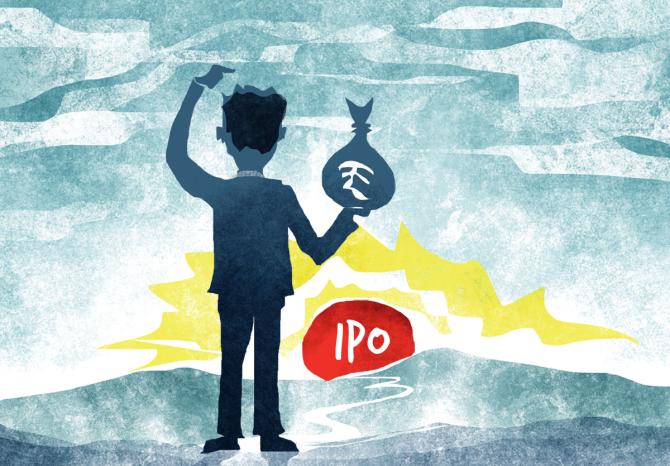The most important step is delivering what is needed -- a fairer IPO pricing, notes Debashis Basu.

Towards the end of every bull market, glamorous companies, chaperoned by blue-blooded investment bankers, dump a bunch of extremely high-priced initial public offerings (IPOs) on the public.
The prices drop on listing and inflict large losses on investors.
In July last year, CarTrade made an IPO at Rs 1,585. Its stock price closed at Rs 604 recently, a loss of 62 per cent.
A couple of months later came Policybazaar, with its IPO priced at Rs 980. The stock closed at Rs 487 recently, a 50 per cent drop.
A week after Policybazaar came Paytm, with an issue at Rs 2,150. Paytm's price was Rs 707 recently, a fall of 67 per cent.
The big daddy of them all -- Life Insurance Corporation of India -- made an issue at Rs 949. The price recently is Rs 624, a 34 per cent loss.
Social media is rife with bitter complaints about the mercenary pricing of IPOs, blaming the market regulator for allowing greedy issuers and investment bankers to cheat the innocent public. This has happened every time.
Stung by the criticism, the Securities and Exchange Board of India, feels compelled to make some cosmetic changes -- until exactly the same thing repeats itself a few years later.
This time, the change is -- don't hold your breath -- more disclosures.
Sebi has announced 'stricter information disclosures' in an effort to bring down the 'information asymmetry' between issuers and investors.
Information asymmetry refers to the situation where the seller knows more about the product he is selling and so can dupe the buyer if he wants to.
What is this information that will supposedly level the playing field between institutional investors, issuers and retail investors, over and above the humungous and mandatory information deluge in the offer document?
Sebi has said that issuer companies, in addition to audited financial numbers, must disclose their numbers on key performance indicators not covered in the offer documents in different sections of the prospectus.
It has also directed issuers to disclose details related to the pricing of shares based on fund-raising from private-equity (PE) investors prior to the IPO.
Secondary sales or acquisitions in the 18 months prior to the IPO must also be disclosed.
In case there have been no transactions in the 18 months, information should be disclosed on price per share based on the last five primary or secondary transactions, not older than three years prior to the IPO.
Issuer companies will also have to disclose the weighted average cost of acquisition based on primary and secondary transactions.
This will show the valuation of the company at every stage of transaction, allowing investors to compare at the time of the IPO.
In addition, the committee of independent directors of the issuer will have to justify the price band to the investors (a box that can easily be ticked by getting the price bands certified by external consultants).
Now, what will investors do with this additional information that will be placed alongside other such information inside a 500-page legal document, which they do not read before they invest in CarTrade, Zomato, or Paytm?
If the latest set of disclosures were in place, would investors have shunned them?
This additional information will not resolve the information asymmetry issue simply because there is no dearth of quality information that is needed to make an informed decision about IPOs.
Remember, millions of people did not invest in these stocks because these are loss-making companies with no immediate hope of turning profitable. That is all the information they needed to make a decision.
Disclosure is at the heart of India's regulatory philosophy, but it may be worth examining whether the information deluge of a 500-page IPO prospectus is really a farce.
Disclosures vs barriers
The real question is: Does Sebi believe (with the benefit of hindsight) that companies like Zomato and CarTrade should not have been allowed to make IPOs and should it stir itself to do anything to prevent retail investors making large losses on high-priced IPOs?
If the answer is negative, why tinker with disclosures?
If, on the other hand, Sebi feels that some of these IPOs ought to have been stopped or their pricing been more reasonable, mandating more disclosure is pointless; it has to look for direct intervention.
After all, Sebi does not apply the disclosure-based philosophy equally everywhere. It mandates all sorts of barriers in other parts of the securities market.
Sebi has mandated minimum capital requirements for advisors, research analysts, portfolio managers, and mutual funds, even when none of these businesses is required to use its capital for customers in any emergency.
No matter how much a client loses, an investment advisor cannot be asked to make good the losses from his own capital, but Sebi has still set a Rs 50 lakh (Rs 5 million) capital requirement for advisors.
In one fell swoop it raised the capital requirement of mutual funds from Rs 10 crore (Rs 100 million) to Rs 100 crore (Rs 1 billion).
These barriers, including licensing and registration, have been erected to 'protect' investors, since Sebi knows that disclosures alone are not enough.
In the same vein, Sebi can easily disallow loss-making companies from making IPOs. Allowing loss-making, PE-funded companies to make IPOs has only meant massive transfers of wealth from retail investors to PE funds that had initially invested at a fraction of the price.
Ironically, disclosures have only ended up giving a regulatory fig leaf for this brazen rip-off.
Banning loss-making companies from coming to the public market is simple, but the most important step is delivering what is needed -- a fairer IPO pricing. Provided, of course, that is what Sebi wants.
Debashis Basu is the editor of moneylife.in
Feature Presentation: Rajesh Alva/Rediff.com











